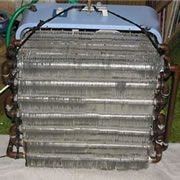Water Heat Exchanger
Introduction
Tipo Water Heat Exchanger heating is thermodynamic process using energy source to heat water above its initial temperature. Typical household uses hot water are for cooking, cleaning, bathing, space heating. In industry, both hot water and water heated to condensation have many uses. Domestically, water is customarily heated in vessels known as water heaters, kettles, cauldrons, pots, or coppers. This Exchanger metal vessels heat a batch of water, produce a continual supply of heated water at a preset temperature. Its energy such as solar energy, heat pumps, hot water heat recycling and heating, may also be used as available, usually in arrangement with backup systems supplied by gas, oil or electricity.
Specifications of Water Heat Exchanger:
- Long-term energy savings: Although a water heater might cost more initially it may result in both energy and cost savings in the long term. As water is heated only when it is needed, there is no storage of hot water.
Applications of Water Heat Exchanger:
- Unlimited hot water:As water is heated while passing through the system an unlimited supply of hot water is available with a water heater. Although flow rate will determine the amount of hot water that can be generated at one time it can be generated indefinitely. However, this can also be a disadvantage, as running out of hot water self-limits use while a heater has no such limit.
- Less physical space:Most water heaters can be mounted on a wall or even internally in a building’s structure. This means less physical space has to be dedicated to heating water. Even systems that can’t be mounted on walls take up less space than a tank-type water heater.
- Reduced risk of water damage: No stored water means there is no risk of water damage from a tank failure or rupture, although the risk of water damage from a pipe or fitting failure remains. Improper piping in either the hot or cold water lines to the water heater can result in water damage though.
- Safety:Water Heaters can precisely control the temperature of the treated water, which means dangerous temperature levels & spikes are no longer a problem. With a tank, water is kept warm all day even if it never gets used and heat loss through the tank walls will result in a continual energy drain. Even in buildings with a high for hot water, a water heater may provide some level of savings.
Advantages of Water Heat Exchanger:
- Water Heat Exchanger will vary based the consumption rate of hot water, the water becomes cooler as flow is increased. In some countries district heating is a main source water heating in compactly populated urban areas.
Images:


